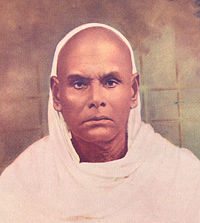Gurus & Saints of India
Narayana Guru

Nārāyana Guru (1855 - 1928), also known as Sree Nārāyana Guru Swami, was a prophet, saint, sage and social reformer of India. The Guru was born into an Ezhava family, in an era when people from the backward communities like Ezhavas faced much social injustices in the caste-ridden Kerala society. Gurudevan, as he was fondly known to his followers, revolted against casteism and worked on propagating new values of freedom in spirituality and of social equality, thereby transforming the Kerala society.
Nārāyana Guru is revered for his Vedic knowledge, poetic proficiency, openness to the views of others, non-violent philosophy and his unrelenting resolve to set aright social wrongs. Nārāyana Guru was instrumental in setting the spiritual foundations for social reform in today's Kerala and was one of the most successful social reformers who tackled caste in India. He demonstrated a path to social emancipation without invoking the dualism of the oppressed and the oppressor.
Guru stressed the need for the spiritual and social upliftment of the downtrodden by their own efforts through the establishment of temples and educational institutions. In the process he brushed aside the Hindu religious conventions based upon Chaturvarna. His transformation of the social face of Kerala relied on emphasizing, yet re-evaluating, the Advaita philosophy of Adi Sankaracharya.
Nārāyana Guruís philosophy
Since Adi Shankara, Sree Nārāyana
Guru was the greatest proponent and re-evaluator of Advaita Vedanta and
hailing from the same region, i.e., present day Kerala. Nārāyana Guruís
philosophy, which is fundamentally of Advaitic and non-dual wisdom in
principles, further extended Advaita concepts into practical modes of self-realisation
through spiritual education, compassion and peaceful co-existence among the
human race, whilst promoting social equality and universal brotherhood. His
philosophy of non-violence and ahimsa strongly denounced discrimination in
the name of caste or religion, and emphasised focusing on education and
private enterprise for the ongoing uplift of the quality of life. The Guruís
philosophy emphasised the consistency between true existence of the "common
reality" on Earth and one Divine behind the creation and sustenance of the
Universe, dismissing any concepts of illusory worlds.
The Guruís philosophy is exemplified in his mystical writings that are truly
interchanging warps and wefts of ethics, logic, aesthetics and metaphysics
woven into masterpieces of silken rich poetry. The Guruís literary works are
in Malayalam, Sanskrit and Tamil languages, and these works are of a
conceptual and aesthetic quality at par with the Upanishads.
At the time of its conception, Nārāyana Guruís philosophy was in many
respects ahead of its time and focused on a futuristic world order that
could be shaped from his philosophical connotations that are underlain with
transcendental aesthetics and logic embodied in knowledge and pure reason.
Most of the serious scholars of Nārāyana Guruís philosophy have been from
generations beyond his lifetime; and this list keeps growing.